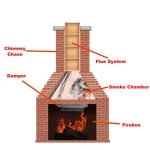Fireplace Ashes in Vegetable Garden: A Guide to Their Benefits and Uses
As the chilly weather sets in and we cozy up by the fireplace, it's important to remember that the ashes left behind can be a valuable resource for our gardens. Fireplace ashes contain essential nutrients, minerals, and trace elements that can benefit plants and improve soil health. Here's a comprehensive guide to understanding the benefits and uses of fireplace ashes in vegetable gardens:
Nutrient Content and Soil Benefits:
Fireplace ashes are rich in potassium, calcium, magnesium, phosphorus, and other essential plant nutrients. These nutrients help improve soil structure, aeration, and water retention. Potassium is vital for fruit and flower production, while calcium promotes healthy root development and disease resistance. Magnesium aids in photosynthesis and chlorophyll production, and phosphorus stimulates early growth and root development.
pH Balancing and Pest Control:
Fireplace ashes have an alkaline pH, which can help neutralize acidic soil conditions. This is particularly beneficial in areas with high rainfall or acidic soil types. Additionally, the alkalinity of ashes can deter certain pests and diseases, such as slugs, snails, and fungus gnats. The high pH environment creates an unfavorable environment for these pests to thrive.
Enhancing Compost and Mulch:
Adding fireplace ashes to compost piles helps balance the acidity of other organic matter and speeds up the decomposition process. Ashes provide essential minerals and nutrients to the compost, making it a richer soil amendment. Similarly, spreading fireplace ashes around plants as mulch can improve moisture retention, regulate soil temperature, and prevent weeds.
Application Methods:
Before using fireplace ashes in the garden, ensure they have cooled completely. Spread the ashes sparingly around plants, avoiding direct contact with roots or foliage. For compost, mix small amounts of ashes with other organic matter, such as leaves, grass clippings, or kitchen scraps. When adding ashes to the soil, work them in lightly to avoid creating a highly alkaline environment that could harm plants.
Cautions and Considerations:
While fireplace ashes can be beneficial, it's important to use them in moderation. Excessive application can lead to excessive alkalinity and nutrient imbalances in the soil. Only use ashes from untreated wood, as burning treated lumber or other materials can introduce harmful chemicals into the environment. Additionally, avoid adding ashes directly to seedlings or young plants, as they are more sensitive to high pH levels.
By incorporating fireplace ashes into your vegetable garden, you can reap the benefits of their nutrient-rich composition, pH-balancing capabilities, and pest-deterring properties. With proper application and caution, fireplace ashes can help create a thriving garden ecosystem that nourishes your plants and enhances the overall health of your soil.

Fireplace Ash Can Be A Boost For Garden Soil But Cautious The Seattle Times

How To Use Wood Ashes In The Garden And Why They Work
Wood Ash From Fireplaces Stoves Can Sometimes Help The Soil Ap News

How To Use Wood Ashes Help Your Vegetable Garden More

Wood Fireplace Ashes For Your Vegetable Garden Southeast Agnet

Are Fireplace Ashes Good For My Vegetable Garden

What To Do With Ashes From Your Fireplace And Wood Stoves

How To Compost Wood Ashes Gardener S Path

Are Fireplace Ashes Good For The Garden Vertical Chimney Care

Why And How To Use Wood Ash In The Garden Creative Simple Living
Related Posts








